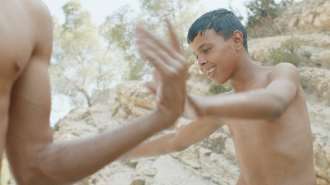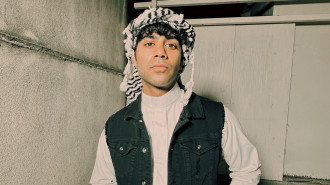
Zazuka's pop-folk meshes the melodies of Circassian culture

Smoothly transitioning between her native Adiğbeze (Circassian) language, Arabic, English and Turkish, the Berlin-based, Jordanian-born Zazuka has released her latest EP Azem yi Pxu. Her work carefully arranges the music and myths of a dispersed people and uses the perennial idea of travel to emphasise the pain of exile.
As Zeina Azouqah, the woman behind Zazuka explains "Azem yi Pxu translates to 'daughter of the healer' and is a take on my paternal name, 'Azouqah', which translates to 'son of the healer'. It's my way of owning my heritage in a culture that always reminds me I'm a woman?"
"New sounds and sensibilities are exactly what we are getting from Zazuka's delicately and fastidiously produced distinctive work where many elements coexist in beautiful harmony"
Her paternal and maternal families were forcibly displaced from the regions now called the Republics of Kabardino-Balkaria and Adygea in the North Caucasus mountains, bordering Georgia, during the Circassian Genocide during and after the Russo-Circassian War (1763–1864) when around 800,000–1,500,000 people were ethnically cleansed or expelled.
“Our families travelled through then-Ottoman Turkey to Jordan after the Circassian Genocide. It is worth mentioning that the genocide was preceded by one hundred and one years of war, embargo and resistance with Tsarist Russia. Many other families landed in different regions of the Levant, which is why we have relatives all over the region,” said Zeina. Most Circassians now live in modern-day Turkey and have made it their home.
Growing up, Adiğbeze was interspersed with Arabic but Zeina was not fully aware of the differences: “As a child, I didn't know that my Arab classmates didn't understand certain words I was saying, because I didn't make the distinction of being part of an ethnic minority.
"My parents focused on raising us as humans first of all. Discovering the Circassian part of my identity happened later, at around 9 or 10 years of age, when I started dancing in the folklore group and when my uncle who lives in Kabardino-Balkaria was visiting us,” explained Zeina.
As Zeina grew more curious, she resorted to the wisdom of her grandmother who sang Circassian folk songs and explained Circassian heritage. One of the stories that Zeina's grandmother told her was the story of Adiyux or Adiyuf, the first story of elopement.
As Zeina explained: "A couple of lovers eloped on horseback and the bride-to-be was thrown off the horse when it suddenly reared up at the sight of a large bird who took them all off guard. She cracked her head open and her to-be husband sat down and sang to her a tragic song on the spot.”
The emergence of the internet and its use as a tool to disseminate information opened to Zazuka new horizons of knowledge to quench her adventurous curiosity.
In the late noughties, Zeina moved to Germany to pursue her studies in film and animation. She ended up composing scores and music for a number of productions.
Zeina was recently been awarded the German DOK.composition Award by Sonoton Music for her composition for the documentary film Harvest Moon by Jordanian filmmaker Rama Ayasra.
The two artists had previously collaborated on Ayasra’s surrealist fiction film Cadence of the Valley where the “nai” (a reed instrument) is the centre of both the film and the score.
"The history of the Circassian people who settled in the Levant is not often spoken about but Zazuka is eager to share her heritage with the world"
For Harvest Moon, Zeina played the nai herself. “It's actually an instrument made by the hands of one of the activists in the documentary. He made it from Jordanian-sourced cane, which is very much in line with his vision of making use of local resources rather than imports.
"The film and the initiative behind it talk about 'Al Barakeh wheat' and are focused on achieving food sovereignty and increasing the planting of indigenous types of wheat rather than importing genetically modified and bleached flour. It's our responsibility as urbanised folk to preserve indigenous flora. This, in many ways, is linked to my interest in preserving endangered cultures and languages."
This motivation and many other cultural encounters are interpreted in Zeina's upcoming EP, to be released on June 30. The four-track EP is a wealth of the lived languages that Zazuka has experienced, including Adiğebeze, Arabic, Turkish and English.
The EP is rhythmically inspired by the Arabic dabke and Adiğe folk rhythms, laced with classical and experimental sounds under the influences of the EP’s co-producer Maxi Menot who is a classical clarinettist turned pop producer.
Starting with her Circassian roots, the EP opens with Zazuka’s released single Orira where Zeina conjures the mythological figure of 'The Tree Lady': “Her roots run deep into the earth and hold all earthly knowledge," Zeina explains. "Her branches spread to the stars and contain all celestial knowledge. It’s stabilizing to meditate on this wise figure when I feel too high in the clouds or too heavy on the ground.”
Zazuka recalls a set of stories by Dr Amjad Jaimoukha that she translated to Arabic as part of a university project during her studies in Amman. “The Tree Lady features in the tale of the Ironsmith deity, Lhepsch, who travels the world and finds himself in her realm. They fall in love and have a child, but he grows homesick and abandons her together with their child. She warns him to not lose their child, to whom she passed on all her knowledge, but alas, the child goes astray and with him, all the knowledge about harvesting and the constellations that Lhepsch’s folk needed to survive the changing seasons.”
The song starts off in English, leading to the bridge in the endangered language of Adiğebze, where both Western and Eastern (Chemirgoy and Kabardian) dialects meet. “This song is a very personal take on what it means to be living in the diaspora after generations of trauma of displacement. The verses are full of longing and remembrance for a homeland never visited as it was,” Zeina told The New Arab.
|
Following Orira is the beautiful and upbeat single Dhahikat, where cheerful tunes and soulful instrumentation meet. A feminist anthem in its own way, women dance defiantly against aggression, while contemplating the meanings of friendship accompanied by opulent plucked strings. “It was laborious at first because I was writing pages and pages of what I felt about my experience as a woman moving through this world. I wanted to distil all this muddy water and pour out a fresh drink, to turn all the anger and frustration into something sparkling."
There is also Digital Debris, a song which tackles the overwhelming digital dump of our virtual age. “I posted a photograph on Instagram and wrote a short poem underneath it which became the basis for the lyrics.”
From there, a social media post is transformed into a progressive pop synth, guitar and drums-driven single reminiscent of Kate Bush’s theatricality.
The EP concludes with a nod to Anatolian cadences. “At 27 I fell in love with a Turkish man whom I am still with, so the love song on the record is in Turkish.” Through her partner, Zeina's immersion in the Turkish community meant that she listened to Turkish music on a daily basis and watched Turkish films to help her understand cultural references better.
Every track on the EP is meant to be a creation of its own, threaded together by Zazuka’s mellifluous voice accompanied by Maxi Menot’s omnipresent clarinet. “Most of the songs were recorded live (in one take) and acoustically in the studio; drums, percussion, oud, qanun, electric bass and guitar, clarinet and bass clarinet, piano with some atmospheric programmed sounds.”
New sounds and sensibilities are exactly what we are getting from Zazuka's delicately and fastidiously produced distinctive work where many elements coexist in beautiful harmony.
Christina Hazboun is a Palestinian writer, researcher and music manager, who focuses on independent, non-mainstream music from South West Asia and North Africa. She is also the founder of the music discovery platform @thesonicagent
Follow her on Instagram: chrishazboun

![Palestinians mourned the victims of an Israeli strike on Deir al-Balah [Getty]](/sites/default/files/styles/image_684x385/public/2024-11/GettyImages-2182362043.jpg?h=199d8c1f&itok=xSHZFbmc)


![The law could be enforced against teachers without prior notice [Getty]](/sites/default/files/styles/image_684x385/public/2178740715.jpeg?h=a5f2f23a&itok=hnqrCS4x)
 Follow the Middle East's top stories in English at The New Arab on Google News
Follow the Middle East's top stories in English at The New Arab on Google News


